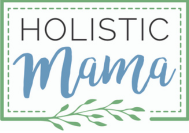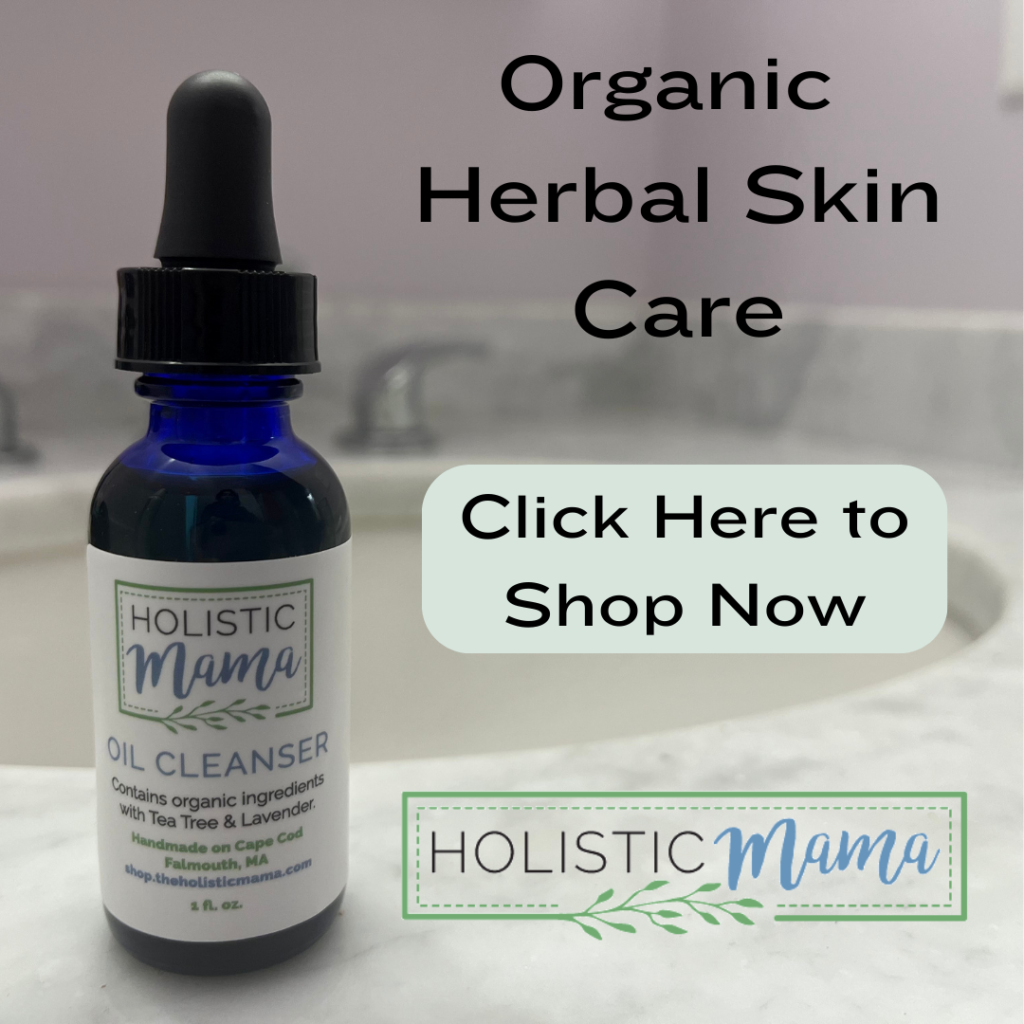-
Where to Buy Organic Food Online for the Best Prices
Category: Real Food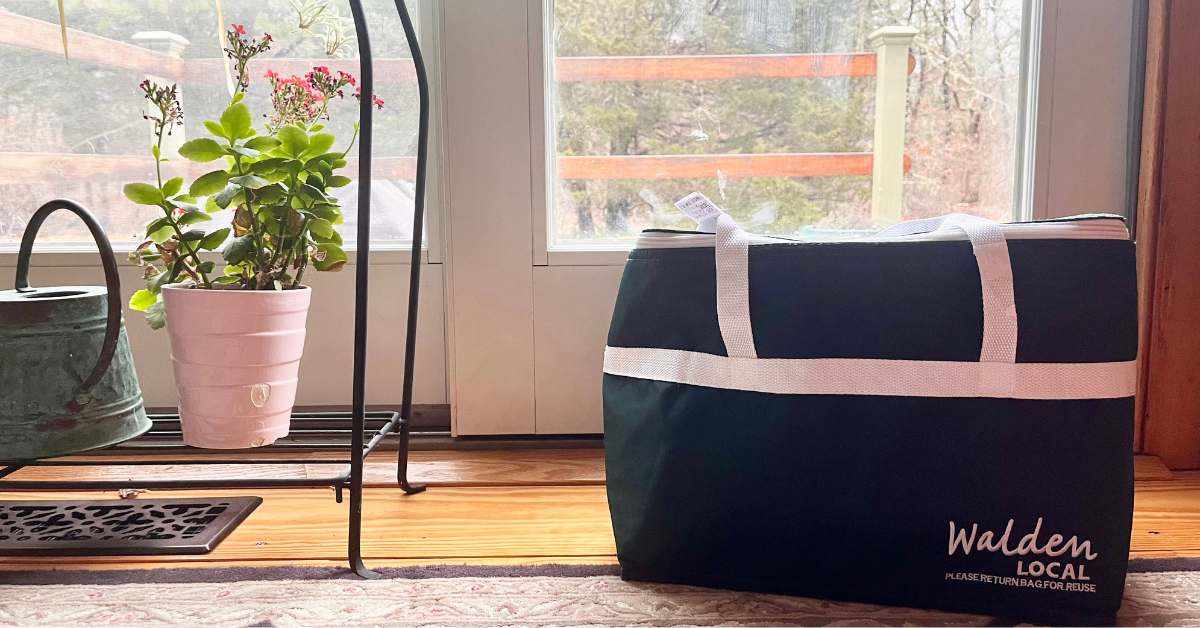
Wondering where to buy organic food online? If you are, you're not alone. With grocery store prices rising and food scarcity looming, people are wondering about best online organic food stores. Before lockdowns in 2020 most people weren't thinking about buying food online. Online Grocers were just starting out a few years prior. Lack of access to the store got me doing some research on places online to purchase food. There are several benefits to purchasing food online. Access to more healthy options and saving money to name two.
Best Online Organic Food Stores
Not all grocery stores have a good selection of organic food. Even if they do it is limited. There are two companies who also noticed this issue and offered some solutions.
Thrive Market
One of the larger ones you probably have already heard about is Thrive Market. I started ordering from them in 2020 and I haven't stopped. They have a wide variety of products that I can't find locally. I also appreciate that there is a large selection of gluten-free products as well. Thrive Market accepts SNAP EBT benefits which is really helpful for those who have that. Sign up for a membership using this link and you will get 40% off your first order plus a free gift.
Misfits Market
Another company I ordered from for a short time is Misfits Market. They really started getting big when everyone was home and access to the stores were limited. Inserted out offering excess organic produce to customers directly. They claim it was the produce that wasn't quite as pretty as the ones we see in the store but still fresh and healthy. It was a great service but I couldn't get out of the house. If you live further away from grocery stores or local farms this would also be a good option for you. Use this link to place your first order and get $10 off
Amazon
Now that Amazon and Whole Foods are the same company, there are actually some very good deals on food on Amazon. There are some things that I use a lot and I can usually find them in larger quantities on Amazon at a better price. Some of the things I order regularly are coconut milk (by the case for making yogurt) and Made Good granola bars. Read this post for more healthy packaged snack options.
Where to Buy Organic and Pasture Raised Meats Online
In addition to organic food brands and produce quality Meat is hard to come by. big chain grocery stores offer a little to no options when it comes to grass-fed beef, pasteurized chicken and eggs.
Years ago I lived in an area where I had access to a food delivery service from Amish Country Pennsylvania. It was wonderful, each week you would put in your order and it was delivered locally for pickup. When I moved out of that area and it wasn't an option anymore I was searching for alternatives.
Walden Local
I tried a few different companies and the 1 that I've stuck with is Walden local Meats. The quality has been outstanding and I like that it comes from local New England Farms. Use this link to place your first order and get $25 credit.
These are only a few of the options where to buy organic food online. I can personally recommend these options since I have tried them all myself. If you have found other good resources, please share in the comment section!
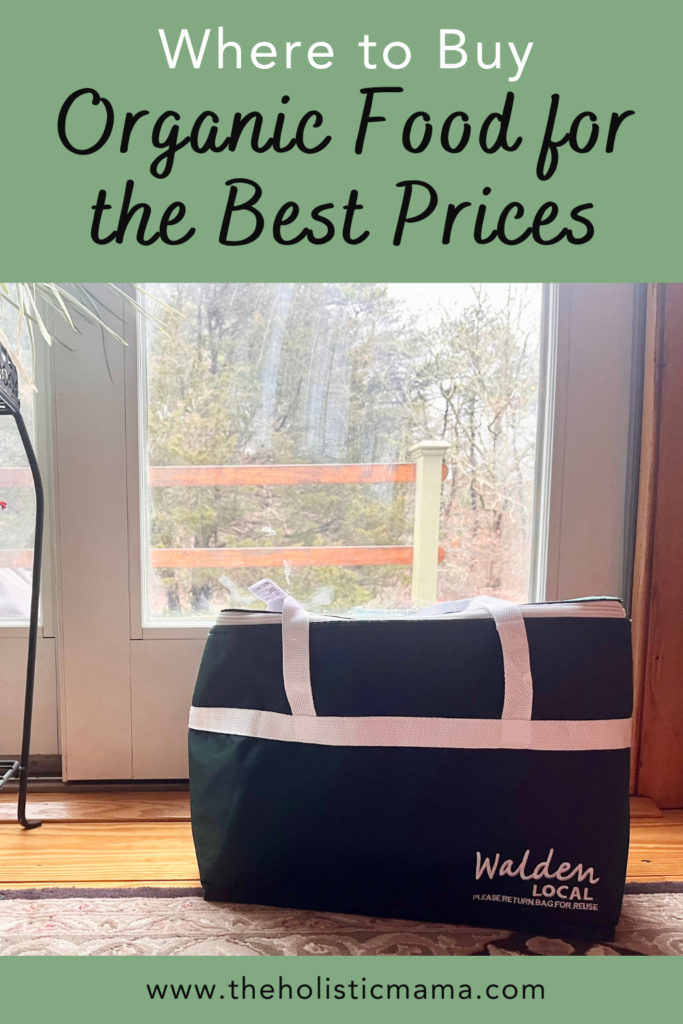
Thank you for reading this post, don't forget to subscribe to stay in the loop. If you are looking for some of the healthy tools and resources mentioned in my articles, take a look at my healthy shopping guide.
Some of our links are affiliate links, which means if you click and buy, I earn a small commission. The price is the same for you, though. Thank you!
You might also like these posts…
-
Best Herbal Reference Books for Beginners
Category: Herbalism
The best herbal reference books for beginners are simple and easy to use. When you first start working with herbs there is a lot to learn.
Foraging
If you are planning to forage for your herbs you will first need to learn plant identification. There are great books written for different regions of the world. These books reference all types of plants you might find in your area.
Herb Profiles
Even if you are not planning on foraging for your herbs it is still useful to know what the plant looks like. If you don't have knowledge of foraging and plant identification you can start by purchasing herbs from an herb shop. You will need an herbal reference book. This type of book will usually have a page for each herb. It will outline the plant constituents and actions, history, uses, and how to prepare them. This type of book is absolutely necessary when you are getting started.
Herbal Preparations
Another type of books that is necessary is one that describes the many different ways to prepare herbal remedies. It will detail the differences between making a tea or an infusion or a decoction. You will get instructions in the book for making syrups, tinctures, herbal vinegars, and more. I have some of these preparations details in step by step blog posts like how to make a tincture and how to make a cold infused oil. As you work with herbs you will learn which preparations are ideal for each type of herb or each type of ailment. It's very important to understand so why and the how for each type of preparation.
Herbals
In addition to these basic types of books there are many herbals written by wonderful experienced herbalists. You may start to grow a collection of different books written by many different herbalist. The variety of recipes you will find is wide you will even find some different nuances in the way to make different herbal preparations.
When first starting out make sure you purchase herbals from experienced and knowledgeable herbalists I love every book that I own written by Rosemary Gladstar and I couldn't recommend her books enough. As you begin to work with plants you will figure out what type of herbalist you will be. Many herbalists use the folk method of creating Herbal Remedies (which is what I use). Others use more scientific methods including measuring and weighing. That is fine too and of course you will get great benefits from those remedies so it's really just personal preference on how you want to prepare your remedies. Here is my list of best herbal reference books for beginners.
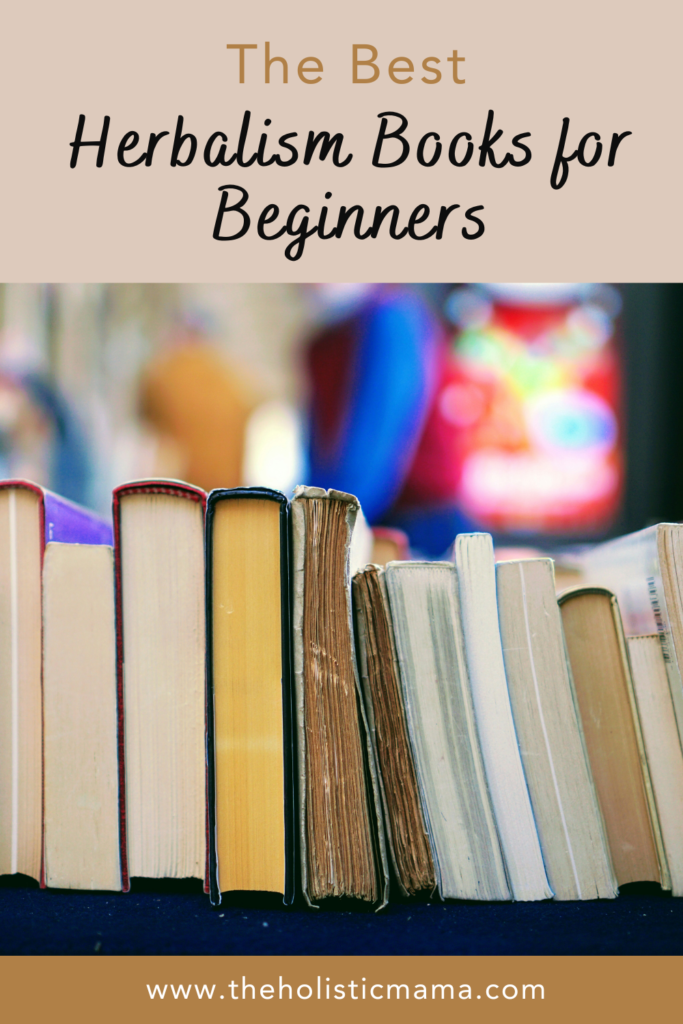
Foraging Books for Beginners
Best Herbal Reference Books
- The Encyclopedia of Herbal Medicine
- The Botanical Bible by Sonya Patel Ellis (beautiful book!! makes a great gift)
Herbal Preparations Book
- The Herbal Medicine Makers Manual by James Green
- A Clinical Guide to Blending Liquid Herbs: Herbal Formulations for the Individual Patient
Herbals by experienced Herbalists
- Herbal Recipes for Vibrant Health by Rosemary Gladstar
- The Lost Book of Herbal Remedies by Nicole Apelian
- Herbal Healing for Women by Rosemary Gladstar
- Herbal Antibiotics by Stephen Harrod Buhner
- The Modern Herbal Dispensatory Thomas Easley and Steven Horne
- Making Plant Medicine by Richo Cech
- Wild Remedies by Rosalee de la Foret.
Thank you for reading this post, don't forget to subscribe to stay in the loop. If you are looking for some of the healthy tools and resources mentioned in my articles, take a look at my healthy shopping guide.
Some of our links are affiliate links, which means if you click and buy, I earn a small commission. The price is the same for you, though. Thank you!
You might also like these posts…
-
Amazing Gluten free Sourdough Pizza Crust Recipe
Category: Gluten Free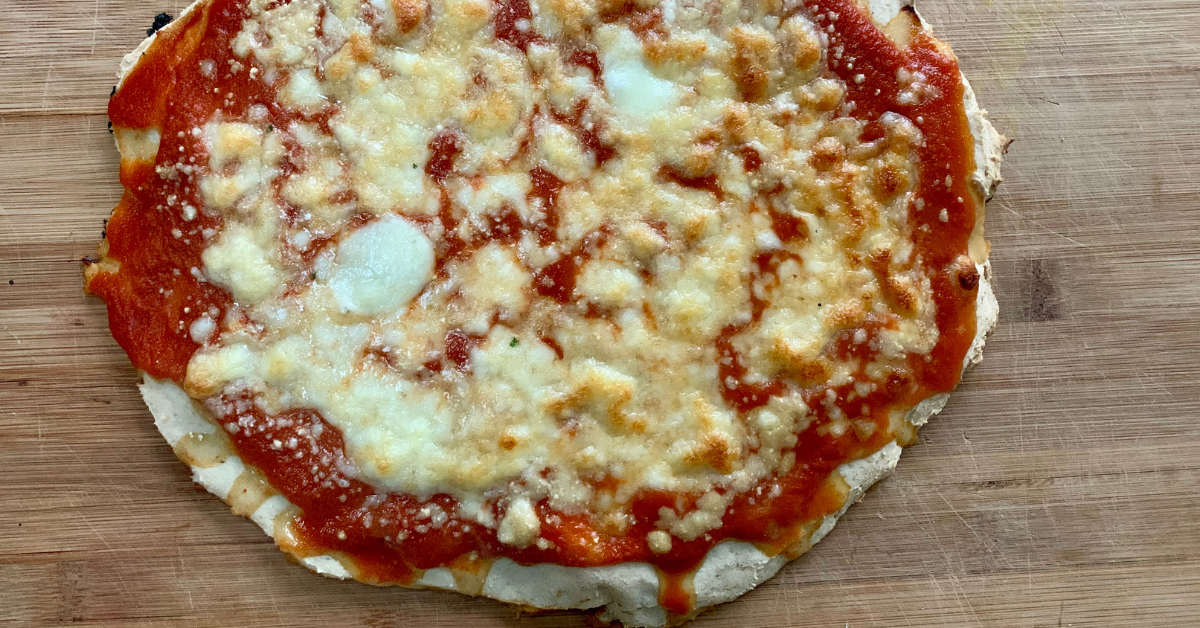
Gluten-free sourdough pizza crust is the closest to traditional pizza crust recipes you will find. There are an endless amount of gluten free pizza dough recipes in a quick google search but few use sourdough. It takes a little bit of extra work and planning when using sourdough but it is worth it. In addition to the gluten free sourdough starter there is another ingredient that helps this dough taste more like regular pizza. The psyllium husk actually works similar to the gluten in wheat to make the dough more pliable.
The day before you are ready to make pizza, remove your sourdough starter from the refrigerator and feed it with enough flour and water so that you have 1 and a quarter cup starter. By the next day your starter will be happy enough to use in this recipe. If you have the proof setting on your oven that works wonderfully for Rising pizza dough or bread. If not, a warm corner of your kitchen will do. If you are not making pizza that same day you can also leave the dough in the refrigerator for 24 hours.
This gluten-free sourdough pizza crust recipe we'll make 2 small pizzas. Double the recipe for 4 small pizzas or 2 large pizzas. Power baking lacrosse for 15 minutes will leave it a little bit soft so if you prefer a crispier crust par bake this for 20 minutes.
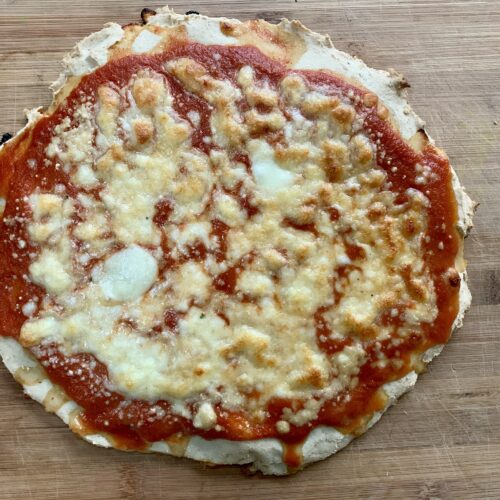
Gluten-free Sourdough Pizza Crust
Ingredients
- 2 1/2 tbsp psyllium husk (not powder)
- 1 1/3 cup room temperature water
- 1 1/4 cup gluten free sourdough starter
- 1/2 cup tapioca starch
- 1 1/3 cup sorghum or brown rice flour
- 1 1/2 tsp salt
Instructions
- First add the psyllium to the water and whisk to combine, let sit 5 minutes
- Add the sourdough starter and mix to combine
- Add all remaining ingredients and mix until combined
- Cover the bowl with a towel or plastic wrap and leave in a warm spot for 3-6 hours (or overnight in fridge)
- After rising, split dough into two
- Roll or shape dough with hands onto an oiled pizza stone or cast iron pizza pan
- Bake at 400 degrees for 15 minutes
- Remove from over and add toppings
- Bake an additional 10 minutes
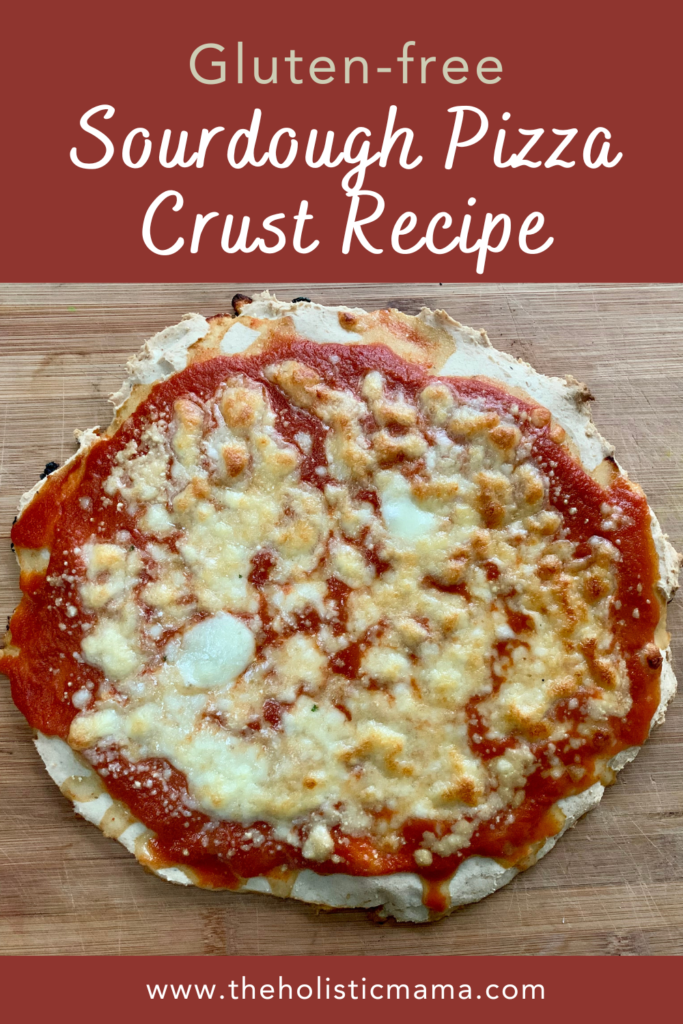
Uses for Extra Gluten free Pizza Dough
Did you accidentally make you pizza dough? So there are other uses if you don't want to make more pizzas. You can use the dough to make calzones. Roll the dough as you would for a pizza and add your feelings like ricotta mozzarella pepperoni and close it up. Be sure to press the edges tightly to keep it closed during baking. Another use for this dough is cinnamon rolls. After you roll the dough out flat brush it with melted butter and cinnamon and sugar. Roll it up into a roll and bake for 10 minutes
Thank you for reading this post, don't forget to subscribe to stay in the loop. If you are looking for some of the healthy tools and resources mentioned in my articles, take a look at my healthy shopping guide.
Some of our links are affiliate links, which means if you click and buy, I earn a small commission. The price is the same for you, though. Thank you!
You might also like these posts…
Holistic Mama Blog
